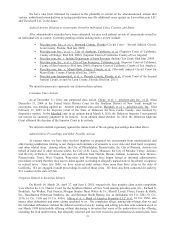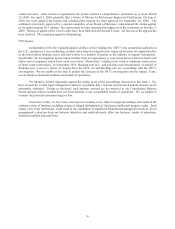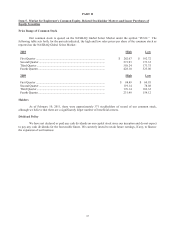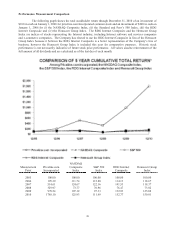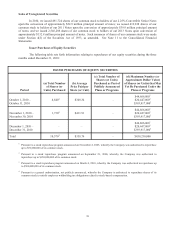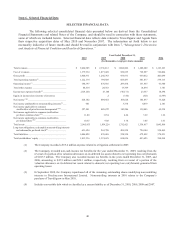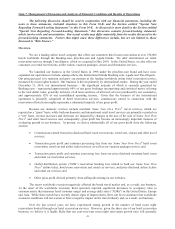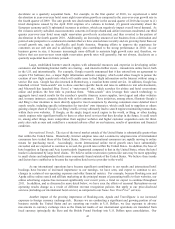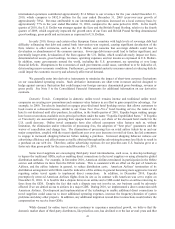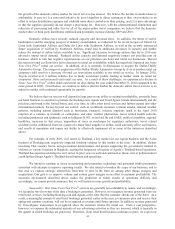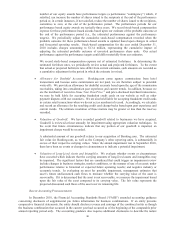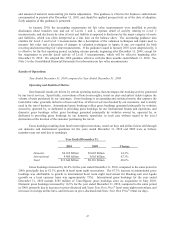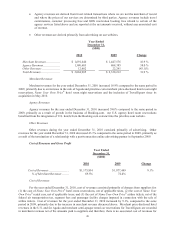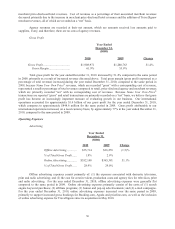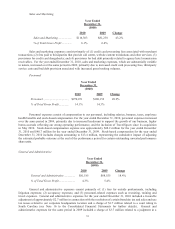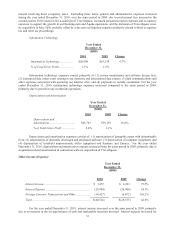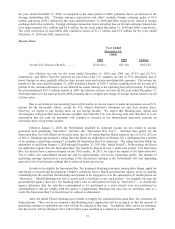Priceline 2010 Annual Report Download - page 117
Download and view the complete annual report
Please find page 117 of the 2010 Priceline annual report below. You can navigate through the pages in the report by either clicking on the pages listed below, or by using the keyword search tool below to find specific information within the annual report.43
international operations contributed approximately $1.4 billion to our revenues for the year ended December 31,
2010, which compares to $852.0 million for the year ended December 31, 2009 (year-over-year growth of
approximately 70%). Revenue attributable to our international operations increased on a local currency basis by
approximately 77% in the year ended December 31, 2010, compared to the same period in 2009. In the fourth
quarter of 2010, the U.S. Dollar was stronger against the Euro and the British Pound Sterling, relative to the fourth
quarter of 2009, which negatively impacted the growth rates of our Euro and British Pound Sterling denominated
gross bookings, gross profit and net income as expressed in U.S. Dollars.
In early 2010, Greece and certain other European Union countries with high levels of sovereign debt had
difficulty refinancing that debt and central bank intervention was required, causing significant devaluation of the
Euro relative to other currencies, such as the U.S. Dollar, and concerns that sovereign defaults could lead to
devaluation or abandonment of the common currency. Sovereign debt issues could lead to further significant, and
potentially longer-term, devaluation of the Euro against the U.S. Dollar, which would adversely impact our Euro-
denominated net assets, gross bookings, revenues, operating expenses, and net income as expressed in U.S. Dollars.
In addition, many governments around the world, including the U.S. government, are operating at very large
financial deficits. Disruptions in the economies of such governments could cause, contribute to or be indicative of,
deteriorating macro-economic conditions. Furthermore, governmental austerity measures aimed at reducing deficits
could impair the economic recovery and adversely affect travel demand.
We generally enter into derivative instruments to minimize the impact of short-term currency fluctuations
on our consolidated operating results. Such derivative instruments are short term in nature and not designed to
hedge against currency fluctuation that could impact our foreign currency denominated gross bookings, revenue or
gross profit. See Note 5 to the Consolidated Financial Statements for additional information on our derivative
contracts.
Domestic Trends. Competition in domestic online travel remains intense and traditional online travel
companies are creating new promotions and consumer value features in an effort to gain competitive advantage. For
example, in 2009, Travelocity launched an opaque price-disclosed hotel booking service that allows customers to
book rooms at a discount because, similar to our Name Your Own Price® hotel booking service, the name of the
hotel is not disclosed until after purchase. In addition, in the fourth quarter of 2010, Expedia began making opaque
hotel room reservations available on its principal website under the name “Expedia Unpublished Rates.” If Expedia
or Travelocity are successful in growing their opaque hotel service, our share of the discount hotel market in the
U.S. could decrease. Online travel companies have also offered consumers value features such as, without
limitation, the elimination and/or reduction of processing fees, the adoption of “best price” guarantees and the
waiver of cancellation and change fees. The elimination of processing fees on retail airline tickets by us and our
major competitors, coupled with the recent significant year over year increases in retail air fares, has led consumers
to engage in increased shopping behavior before making a purchase. Increased shopping behavior reduces our
advertising efficiency and effectiveness as traffic obtained through online advertising becomes less likely to result in
a purchase on our web site. Therefore, online advertising expenses for our priceline.com U.S. business grew at a
faster rate than gross profit for the year ended December 31, 2010.
Some travel suppliers are encouraging third-party travel intermediaries, such as us, to develop technology
to bypass the traditional GDSs, such as enabling direct connections to the travel suppliers or using alternative global
distribution methods. For example, in December 2010, American Airlines terminated its participation in the Orbitz
service and withdrew its fares from the Orbitz website. This is consistent with an effort on the part of American
Airlines, and the airline industry in general, to reduce distribution costs. American Airlines’ termination of its
distribution arrangement with Orbitz could be indicative of the airlines in general becoming more aggressive toward
requiring online travel agents to implement direct connections. In addition, in December 2010, Expedia
preemptively removed American Airlines flights from its site as its contract with American was set to expire on
December 31, 2010. It is feasible that a dispute between an airline and a GDS could lead to an airline removing its
fares from the GDS. Despite the fact that such a dispute may not involve us, our business could be adversely
affected if we are denied access to airfares in a major GDS. During 2010, we implemented a direct connection with
American Airlines. Development and implementation of the technology to enable additional direct connections to
travel suppliers could cause us to incur additional operating expenses, increase the frequency/duration of system
problems and delay other projects. In addition, any additional migration toward direct connections would reduce the
compensation we receive from GDSs.
While demand for online travel services continues to experience annualized growth, we believe that the
domestic market share of third-party distributors, like priceline.com, has declined over the last several years and that




